
|

|
 |
|
|
An up close and personal interview with U.S. Police Veteran and Togetherweserved.com Member:
S/PTL Leon Richard Valdez (1973-2003)
City of Abilene Marshal's Office
WHAT INFLUENCED YOUR DECISION TO MAKE A CAREER IN LAW ENFORCEMENT?
The first time I can remember wanting to be a policeman was when I was in high school. We had a class project to write what we wanted to be someday and I wrote I wanted to be a policeman. My desire was real but I did not have a 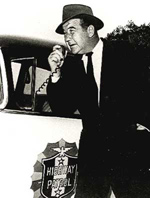 clue what it took to be a policeman nor did I have any idea what it was really like once I became one. I was thinking more about the excitement and adventure I'd seen watching 1950's cop shows such as "Highway Patrol" with Broderick Crawford, "Elliot Ness and the Untouchables" and later "Dragnet" starring Jack Webb clue what it took to be a policeman nor did I have any idea what it was really like once I became one. I was thinking more about the excitement and adventure I'd seen watching 1950's cop shows such as "Highway Patrol" with Broderick Crawford, "Elliot Ness and the Untouchables" and later "Dragnet" starring Jack Webb
The real influence came when I got a taste of law enforcement after I joined the Army Reserves. Following basic training in 1964, I was trained as an Admin Clerk and when I returned home to my Army Reserve unit that was the work I was assigned. As I progressed thru the ranks, I had a chance to cross train in the Military Police . With hands on experience, I found I really liked helping others and enforcing laws that protect the public's safety. That is when I got serious about a law enforcement career.
WHAT HAS BEEN YOUR CAREER PATH AND WHAT ARE YOU DOING NOW?
It is highly possible I would never have been a policeman if my father had not moved our family from the farm to the city when I was 4-years old. He was seeking better work and higher wages. After trying out several jobs, he settled on making window drapes and 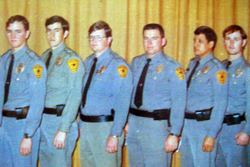 venetian blinds for a local manufacturer. Sometimes on Saturdays he would take me along to help him repair old venetian blinds. Watching my dad work hard and long hours instilled in me a work ethic I carry to this day. At the time I was 12 or 13 and the oldest of eight children. After I left home my parents had another six children. venetian blinds for a local manufacturer. Sometimes on Saturdays he would take me along to help him repair old venetian blinds. Watching my dad work hard and long hours instilled in me a work ethic I carry to this day. At the time I was 12 or 13 and the oldest of eight children. After I left home my parents had another six children.
Although I worked part time making window screens and doors throughout high school I managed to stay in the top half of my class. I gave some thought of going to college but I also felt I could not afford it. When I did graduate in 1964 from Abilene High School I became the first ever in my family to graduate from high school. The same week my part-time job became full time. In November 1964 I joined the Army Reserves. When I returned home from my six months active duty, I went back to my job and moved into a small house on my own. After three years making window screens and doors, I found a better paying job working for the Borden Company as a route salesman in 1968.
In 1969 I met a female student at Angelo State University in San Angelo who was not only smart but beautiful too. To get herself through college, she was working part-time as a long distance telephone operator for the San Angelo telephone company. I continued working for the Borden Company and in 1970 we got married but my desire to be a policeman was still in the back of my mind.
For several years my wife encouraged me to apply for the Abilene Police Department but we knew if I did and was accepted, our income would be cut in half. Although she had quit work and college to raise our daughter, she offered to go back to the telephone company to make up for the lost income. A decision was made and I applied for the Abilene Police Academy. In October 1973 I entered the Abilene Police Training Academy, graduating in January 1974.
As to be expected my first assignment out of the academy was patrol officer. My duties consisted of patrolling, traffic accident investigations, auto theft and burglary investigations, arrests for public intoxication and DUI, some drug offenses, family disturbances and generally any call requesting police assistance. I really enjoyed the "adventure." It was like having a front seat to everything that happens in a city of 100,000.
In 1975 I was assigned to the Public Safety Cruiser, a specialized unit of the Abilene PD which provided First Aid and Rescue operations in which medical assistance was needed including  traffic accidents or any other incidents involving injuries. This was prior to ambulance services we know today as EMS and prior to Fire Departments taking over the responsibility of rescue operations at scenes of accidents. traffic accidents or any other incidents involving injuries. This was prior to ambulance services we know today as EMS and prior to Fire Departments taking over the responsibility of rescue operations at scenes of accidents.
The Police Public Safety Cruiser was manned by two officers at any one time with my usual partner being Craig Fullerton. Since we were dispatched to all calls involving personal injury caused accidental or otherwise, we saw all the meanness that human nature has to offer. But since we were police officers first, there were often times we were dispatched to backup other officers. Although this assignment lasted less than two year, we had the public's support due to the positive nature of our work. We were usually able to quell a disturbance just by our presence and even angry or arguing citizens complied readily at our requests to settle down. Even I was surprised at the positive reaction we receive.
As my police officer salary increased, my wife went back to school, got her Bachelors in Psychology (McM), followed by her Masters in Counseling and Human Development (HS-U) and later in the mid-1990s was pursing her Doctorate in Family Therapy at Texas Women's University in Denton, Texas. Although she did not complete her doctorate due to finances, she opened her own business as an Educational Consultant helping dropouts finish high school and placement in local jobs.
In 1979 I received specialized training in courses involving "juvenile delinquency prevention." The two week course was given at Southwest Texas State University. One of the major topics was what is now known as a School Resource Officer. This was a new innovation in fighting juvenile delinquency. This was the same course many other officers later took to become Juvenile Officers in their Departments.
 In 1980 I was assigned to the Office of Traffic Safety and Public Information. Part of this duty involved a morning "police report" broadcast on several local radio stations. Another aspect of my duties was in the development of a traffic safety project which came to be known as "Safety City," an interactive program where young people could learn, experience, and remember valuable life-saving lessons that would last a lifetime. In 1980 I was assigned to the Office of Traffic Safety and Public Information. Part of this duty involved a morning "police report" broadcast on several local radio stations. Another aspect of my duties was in the development of a traffic safety project which came to be known as "Safety City," an interactive program where young people could learn, experience, and remember valuable life-saving lessons that would last a lifetime.
I might note that I did not seek this position. In our Department when a specialized position opened it is posted within the Department and any officer interested is asked to submit a letter to the Chief requesting consideration to the position. The deadline was on a Friday at 5pm. Shortly before the expiration of the deadline, I was ordered to report to one of the Department's high ranking officers. Getting right to the point, he wanted to know why he had not seen my application for the position. When I told him I was not interested in the position, he "advised" me to submit a backdated letter, go home, talk it over with my wife, and to have the signed letter back in his office by Monday morning. I thought; "oops" and followed his "suggestion" exactly.
Initially I worked with the officer who was being transferred due to a promotion and had six months to learn the job, which really was a public relations position. At first I felt uncomfortable in the position but overcame the discomfort as I went before the public daily. I had to prepare PSAs (Public Service Announcements) on public safety issues, prepare and conduct daily morning police report "Live" on several local radio stations but my biggest responsibility was coordinating the in-progress construction of a facility which would become known as "Safety City." I coordinated all aspects of the project with a local civic group, the Abilene Jaycees and our local Abilene Independent School District. Safety City went operational in 1983.
The Safety City project involved teaching traffic safety to school age children thru a hands-on traffic rules taught in the classroom in a miniature city. Here children (3rd graders) practice the rules applicable to them as pedestrians, bicyclist and even involved their operating an electric powered car under supervision. After 30 years Safety City is still going strong and has become 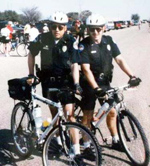 one of the APD most highly successful programs. After 13 years in this position I transferred to my first love--police patrol work. one of the APD most highly successful programs. After 13 years in this position I transferred to my first love--police patrol work.
I was reassigned to the Patrol Division and the newly formed Police Bike Unit which consisted of 18 officers with a Lieutenant in charge. The unit worked civic events, directive patrols and patrolling of the downtown area. The unit became a valuable public relations resource as the officers became highly visible and could easily interact with the citizens. Craig Fullerton was the Bike Unit commander.
The Bike Unit was not my full time duty. It was on an "as needed basis" for special events. Most the time I did patrols from a patrol car. One of the fun things about bike duty was how stealthy we could be, particularly in catching prowlers at night. The bikes were especially effective in areas of high car burglaries in shopping centers or large apartment complex parking lots. I retired from this job in October 2003.
During my 30 years on the force I saw many changes in police procedures, tactics and equipment. In the early years we carried equipment considered lacking by today's standards. I had a Billy club, slapper or blackjack, handcuffs and a .38 long barreled six-shooter, 18 rounds of ammunition, and a shotgun in the squad car. An officer in today's crime fighting world would 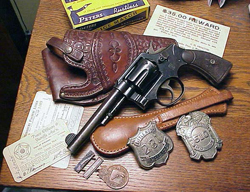 feel "naked" without body armor, Taser, asp, baton, pepper spray, portable radios, and automatic firearms and a police car fully equipped with modern lights, digital radios and mobile data terminals! Fortunately, I was around long enough to enjoy these new innovations of modern police work. feel "naked" without body armor, Taser, asp, baton, pepper spray, portable radios, and automatic firearms and a police car fully equipped with modern lights, digital radios and mobile data terminals! Fortunately, I was around long enough to enjoy these new innovations of modern police work.
During those 30 years I also saw greater emphasis on specialized training and organization structure as well as changes it tactic, advance studies and the advent of modern technology--all which was based on "lessons learned." City leaders also recognized if they wanted to retain officers or attract new officers, wages and benefits had to stay in step with the cost of living.
I am extremely proud to have been a member of this elite organization.
After my retirement from police civil service I continued in my main sports hobby of off-road/mountain biking and was tasked with being a "Trail Master" of our local bicycling trail.
In 2009 the Abilene Police Department offered Abilene Police Officer retirees part-time employment in a newly created position of "Police Assistant" working in various areas in the Law Enforcement field.
Since I was not yet ready to give up law enforcement completely, I took part-time work in the City Marshal's Office. As a Deputy City Marshal I provided security to the City of Abilene Municipal Court and managed and cleared outstanding traffic warrants.
After several years on the job, I was diagnosed with a blood clot in my lower left leg. My doctor recommended I stop working. I took his advice and in January 2013, I retired from police work forever. It was very hard to give it up. Policing is in my blood.
DID YOU SERVE IN THE MILITARY PRIOR? AND IF SO, IN WHAT BRANCH OF SERVICE? IN WHAT WAYS HAS MILITARY SERVICE INFLUENCED YOUR CAREER IN LAW ENFORCEMENT?
Following my graduation from high school, I was still living at home and working full time with a company I had worked for part-time while I was in school. With my increase in wages I decided to open a saving account. I went down to a local bank where I  was sent to a bank official who helped me open my account. During the application progress, he asked what my plans were for the future and if military service was something I may have considered. Turns out he was an Army Reservist and suggested that I visit our local army reserve unit. At the time I was employed by the Borden Company and making good money but my heart was not in doing it for a career. I took his advice, went down to the Army Reserve unit and by November 1964, I found myself at Fort Polk, Louisiana for Basic training followed by AIT and a unit assignment as an admin clerk. was sent to a bank official who helped me open my account. During the application progress, he asked what my plans were for the future and if military service was something I may have considered. Turns out he was an Army Reservist and suggested that I visit our local army reserve unit. At the time I was employed by the Borden Company and making good money but my heart was not in doing it for a career. I took his advice, went down to the Army Reserve unit and by November 1964, I found myself at Fort Polk, Louisiana for Basic training followed by AIT and a unit assignment as an admin clerk.
After six months, I returned home with a six year Army Reserve obligation. That six years turned into 28 years and in 1992, I retired as the unit First Sergeant. It was also in the Army Reserves where I became a Military Policeman which led to my pursing civilian police work.
I served in an Army Reserve unit concurrently during most of my police career, from 1964 until my military retirement in 1992.
During much of my police career I made quite a few public speaking engagements and often told my audiences that since I did not actually go to college, my military experience was my education of higher learning. The many military schools I attended and the steady promotions into leadership positions helped shape my confidence and self-discipline, which also served me very well as a police officer.
WHICH, OF THE AGENCIES OR DEPARTMENTS YOU WERE ASSIGNED TO, DO YOU HAVE THE FONDEST MEMORIES OF AND WHY?
My entire 30-year police career was spent in the Abilene Police Department and I have fond memories from all those years. But I'd have to say developing and managing the Safety City program was the most memorial. I enjoyed the challenge of getting it off the ground and finding 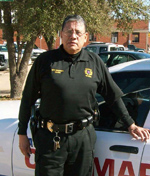 innovative ways to improve it during the 13 years I was assigned to the project. It was very difficult at times because I was supervising construction without any knowledge of such things but I learned quickly. I am very proud of what it was then and what it have evolved into today--one of the Abilene Police Departments most valuable programs. innovative ways to improve it during the 13 years I was assigned to the project. It was very difficult at times because I was supervising construction without any knowledge of such things but I learned quickly. I am very proud of what it was then and what it have evolved into today--one of the Abilene Police Departments most valuable programs.
Working closely with my partner Officer Craig Fullerton was also a high point. We worked together as Safety Cruiser Officers, patrol officers and in the Bike Unit. We had to think alike and work as a team during medical emergencies, crowd control and fast-moving crime situations. This was a time when police officer across the country were experiencing increased civic conflict and citizen hostilities toward police over bitterly divided issues such as segregation, integration and immigration. We were commonly called "Pigs" when we arrived on the scene.
The one exception was when we were making Safety Cruiser calls. We rolled out for all medical, injury and rescue calls so mostly people were happy to see us. I enjoyed this work the most.
FROM YOUR ENTIRE LAW ENFORCEMENT CAREER WHAT PARTICULAR INCIDENT HAD THE BIGGEST IMPACT ON YOU AND WHY?
I had been on the police force for 28 years and had faced many dangerous situations but the one that took place on October 30, 2001 was different from any other.
A call came over my patrol car radio asking for assistance in pursuing a vehicle driven by a suspect wanted 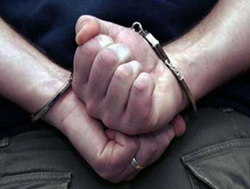 for attempted murder, domestic violence and being AWOL from the Dyess Air Force Base southwest of Abilene. In pursuit were agents from Air Force Office of Special Investigation (OSI) and others Abilene PD officers. It was known that the suspect was armed and dangerous, having already fired at OSI agents. for attempted murder, domestic violence and being AWOL from the Dyess Air Force Base southwest of Abilene. In pursuit were agents from Air Force Office of Special Investigation (OSI) and others Abilene PD officers. It was known that the suspect was armed and dangerous, having already fired at OSI agents.
As I was racing up a major street with lights flashing and sirens blaring, I met up with the suspect and his many pursuers coming from opposite directions. As we grew closer to each other, the suspect came to a screeching halt in the middle of the street about 40 feet in from of me and using his steering wheel, took aim at me and fired three shots through his own windshield. Two shot smashed through my windshield with the third slamming into my driver's side spotlight.
I had already opened my door to take cover and returned fire as his car continued moving past me at a very slow rate of speed. That is when I noticed he was covered with blood. I reached out and pulled on the driver's door as it was rolling forward and noticed a revolver on his lap. I reached in, grabbed his pistol and pulled him out just as his car ran over a curve and stopped. I threw him to the ground and had him in custody just as the rest of the "cavalry" arrived.
All this happened very fast but I recall it seeming like it was happening in slow motion. When all was said and done, officers of the APD were on the scene almost immediately as the suspect was taken into custody along with a second suspect in the vehicle.
The suspect survived his wounds and was tried in both civilian and military courts. He was sentenced to prison at the federal prison in Fort Leavenworth, Kansas.
OF THE MEDALS, AWARDS OR BADGES YOU RECEIVED, WHAT IS THE MOST MEANINGFUL TO YOU AND WHY?
 Regarding the shooting incident, I was awarded the Medal of Valor. Regarding the shooting incident, I was awarded the Medal of Valor.
WHICH INDIVIDUAL PERSON FROM YOUR CAREER MADE THE MOST POSITIVE INFLUENCE ON YOU AND WHY?
For years I had been a big runner and was in good physical shape when I went through the Abilene Police Department Training Academy in 1973. Capt. Lomax Martin was in charge of the academy at the time and noticed I had little trouble with physical fitness training. He asked if I would assist him in the physical fitness training for the next few classes. I was honored he asked and proud to have helped future police officers achieve a measure of physical fitness.
Capt. Martin was also in charge of the Safety Cruise Program and selected me to become one of the unit officers. This selection to an elite unit helped shape my self confidence in police work in general. He also mentored me in other ways as well. Sadly, he passed away in the early 1980's.
CAN YOU RECOUNT A PARTICULAR INCIDENT FROM YOUR CAREER THAT WAS FUNNY AT THE TIME AND STILL MAKES YOU LAUGH?
I had recently completed the Police Academy, gone through the FTO phase where a rookie rides with a veteran officer and was finally "turned loose" to be on my own.
It was probably my second day "solo" when I was dispatched to a major accident in which an 18-wheeler tractor exiting  the I-20 Interstate collided with a passenger car going in the opposite direction on the frontage road. When I drove up I could see the head on collision resulted in multiple injuries and immediately called for medical assistance and other officer to help me with traffic control. There was also spilled diesel fuel from the tractor-trailer's ruptured tank. the I-20 Interstate collided with a passenger car going in the opposite direction on the frontage road. When I drove up I could see the head on collision resulted in multiple injuries and immediately called for medical assistance and other officer to help me with traffic control. There was also spilled diesel fuel from the tractor-trailer's ruptured tank.
I knew what all I had to do in order to process the accident investigation but being a rookie I was naturally nervous and felt like I was running back and forth like a chicken with its head cut off. When a veteran officer arrived and observed the leaking diesel fuel, he asked, "Have you called for a booster yet?" I had no idea what he meant. Seeing my bewilderment he said, "I'll call for one." The booster was a Fire Apparatus used to take care of the spilled fuel.
I don't really know if this was funny but as I now look back to this incident I cannot help from laughing.
WHAT DO YOU CONSIDER THE MOST IMPORTANT LESSON YOU HAVE LEARNED AS A LAW ENFORCEMENT OFFICER?
Early in my career, a veteran officer, Officer JC Jones told me that I needed to "slow down" a bit in handling situations that had the potential of exploding into a dangerous situation for the officer. His advice to me was, "When responding to a domestic issue or fight in progress call, approach the situation with caution and try to defuse the situation by talking to the individuals involved. If that does not work, then you can become John Wayne." I took his advice to mean try a peaceful approach first and if that does not work, crack a few heads so the only one hurt would be the perpetrators and not the officer or innocent bystanders.
This advice helped me in many domestic and other situations involving persons arguing or about to start a fight. I am sure many other officers can relate or have seen other officers struggling with individuals who could have been talked into submission. Granted, it is easier said than done but it is a skill that can be learned.
Ironically, Officer JC Jones was a physically big man (not fat) and policed in an era when physical force was common us and yet here he was teaching me something that few practiced at the time.
WHAT LAW ENFORCEMENT ASSOCIATIONS ARE YOU A MEMBER OF, IF ANY? WHAT SPECIFIC BENEFITS DO YOU DERIVE FROM YOUR MEMBERSHIP(S)?
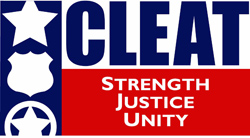 Initially I joined the TMPA (Texas Municipal Police Association) but found it to be too weak to deal with the issues of the time in representing the police membership. Initially I joined the TMPA (Texas Municipal Police Association) but found it to be too weak to deal with the issues of the time in representing the police membership.
I later joined the "then" new association CLEAT (Combined Law Enforcement Association of Texas). This organization was/is very dependable in representing the membership regarding police-city administration issues and other officer issues.
Current Abilene Police officers continue to be served by CLEAT. As a retiree, I no longer am a member.
HOW HAS SERVING AS A LAW ENFORCEMENT OFFICER INFLUENCED THE WAY YOU CONDUCT YOUR PERSONAL LIFE AND YOUR RELATIONSHIPS WITH OTHERS OUTSIDE OF THE DEPARTMENT?
 Very early on in my career as a police officer and as a military leader I learned the best way to get things done was to have the respect of my peers, subordinates, supervisors and more importantly, the citizens we vowed to serve and protect. But building respect requires more than a job well done. I required time, patience and consistency. I also learned respect is not always easily gained or maintained and if lost, regained. Very early on in my career as a police officer and as a military leader I learned the best way to get things done was to have the respect of my peers, subordinates, supervisors and more importantly, the citizens we vowed to serve and protect. But building respect requires more than a job well done. I required time, patience and consistency. I also learned respect is not always easily gained or maintained and if lost, regained.
During my policing career I believe I gave respect to "good citizens" and "bad guys" in equal measure. If I showed respect, the results usually meant I received respect in return.
My showing respect and consideration for other for others has served me well as a policeman, husband, father, brother and friend.
WHAT ADVICE WOULD YOU HAVE FOR A ROOKIE WHO HAS JUST PUT ON THE BADGE?
Police academies are better now than they have ever been and you will have learned well the principles, procedures, tactics and techniques of good policing. But nothing takes the place of being on the mean streets where you will learn up close and personal what it takes to do your job professionally. You will make mistakes. We all did as rookies. The key is to learn from those mistakes and not to repeat the same ones again.
 Whatever you do, do not lose your cool when you come in contact with good guys or, as difficult as this may be at times, bad guys. Be respectfully when dealing with the public. Remember, you represent your police department so avoid being cocky, condescending or sarcastic at all times. And above all else, do not abuse your authority or become a "badge heavy" cop. If you do, you could lose the respect of your fellow officers or get fired or even go to jail. Whatever you do, do not lose your cool when you come in contact with good guys or, as difficult as this may be at times, bad guys. Be respectfully when dealing with the public. Remember, you represent your police department so avoid being cocky, condescending or sarcastic at all times. And above all else, do not abuse your authority or become a "badge heavy" cop. If you do, you could lose the respect of your fellow officers or get fired or even go to jail.
There will be times when you will have to apply what is called the "John Wayne" message. When you arrive at the scene of some public disturbance and if the situation is approachable, talk to those involved and try to reason with them. If that doesn't work and the situation escalates out of control, take whatever action is required in stopping it. That's the John Wayne method.
Be the Professional you were trained to be.
IN WHAT WAYS DO YOU FEEL THIS WEBSITE CAN BENEFIT THE LAW ENFORCEMENT COMMUNITY?
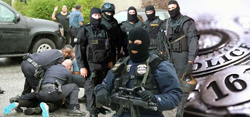 I first joined wanting to reconnect with law enforcement officers from other departments with whom I had met or worked with. I also wanted to meet new law enforcement officers from other police and sheriff's departments throughout the United States. To better my chances I filled out my profile page as completely as possible to include my Reflections. And that is when I realized the huge potential the site has for how we can learn so much from each other. I first joined wanting to reconnect with law enforcement officers from other departments with whom I had met or worked with. I also wanted to meet new law enforcement officers from other police and sheriff's departments throughout the United States. To better my chances I filled out my profile page as completely as possible to include my Reflections. And that is when I realized the huge potential the site has for how we can learn so much from each other.
As I read the profiles of those officers who took the time to write their Reflections and describe in great detail how they approached dangerous and touchy situations it was like reading a handbook on "Lessons Learned."
Rookies from big city police departments or small towns can learn a lot from those of us who have "been there, done that."
| |
|
Share this Voices on:


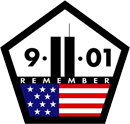

|
|
TWS VOICES
TWS Voices are the personal stories of men and women who currently serve, or who previously served as a US Police or Federal Officer, and conveys how serving their Country and Community has made a positive impact on their lives. If you would like your story to be featured in a future edition of Voices, or know someone else who may be interested, please contact TWS Voices HERE.
This edition of Police Voices was supported by:
Police.Togetherweserved.com
For all current serving and veteran Police Officers, Together We Served is a secure, feature rich website enabling Officers to reconnect with lost Brothers and Sisters, share in the camaraderie of other Officers, network for professional purposes and to honor the service of all.
To join Police.Togetherweserved.com, please click HERE.
| |